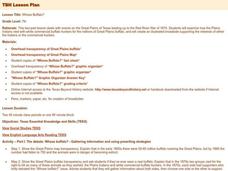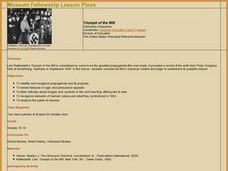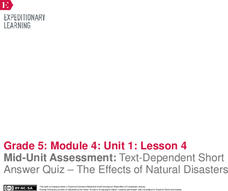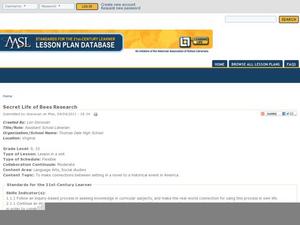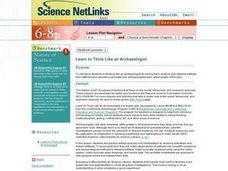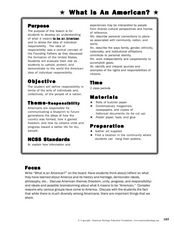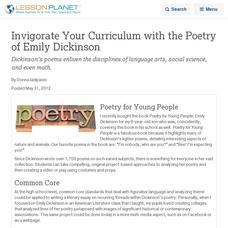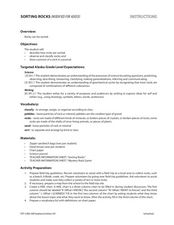Curated OER
Deep like Rivers: Four African American Poets of the 1920s and 1930s
Students examine work by outstanding African American poets from the time period of the 1920s and 1930s. They study aspects of American and African American social, cultural and artistic history that influenced the content of some of the...
Curated OER
Hero vs. Claudio: A Case of Slander
High schoolers research marriage customs of the Renaissance, discuss and debate the issues raised by Claudio repudiating Hero at the altar in the Shakespearean play Much Ado About Nothing, and then stage a mock trial accusing Claudio of...
Curated OER
Muslim Women Through Time
Students examine the culture and stereotypes of Muslim women and discover a combination of items have affected the role of Muslim women as a group and individually over time. Groups research a famous Muslim woman, present their...
Curated OER
Justices for All
Students examine role of Supreme Court justices in the American political process, research the qualities of the current Supreme Court justices, and write opinion papers evaluating the current justices and recommending future nominations.
Curated OER
Whose Buffalo?
Seventh graders examine how the Plains Indians vied with white commercial buffalo hunters for the millions of Great Plains buffalo. They create an illustrated broadside supporting the interests of either the Indians or the commercial...
Curated OER
Triumph of the Will
Learners view the propaganda film, "Triumph of the Will". Identifying propaganda techniques used, they review any fallacies in logic or persuasive appeals. They discover elements in German culture and their meaning in 1934. They...
Curated OER
Native Americans
Students choose two photographs and explain how they illustrate traditional Native American culture. They discuss how traditional Native American culture has been affected by two specific actions of the United States Government, (they...
Friends of Fort McHenry
Sensory “Star Spangled Banner”
Music can help us to access memories and events in a meaningful way, and Francis Scott Key used specific words to convey what he had seen and felt when writing what would become America's national anthem. Help your class connect to the...
Facing History and Ourselves
Taking a Stand: Models of Civic Participation
How does an individual take a stand for a principle or belief? what skills are required to do so? What are the challenges and risks in doing so? Class members study examples of individuals engaging in such activities and then identify...
Curated OER
Henry Wadsworth Longfellow's Christmas Bells
Students read and analyze the anti-slavery poem, "Christmas Bells" by Henry Wadsworth Longfellow. They discuss the content and form of the poem, write an essay, write an original poem, examine how this anti-slavery poem was converted...
North Carolina Consortium for Middle East Studies
Missing Pieces of the Puzzle: African Americans in Revolutionary Times
What's missing from most studies of the American Revolutionary War is information about the role African Americans played in the conflict. To correct this oversight, middle schoolers research groups like the Black Loyalists and Black...
EngageNY
Mid-Unit Assessment: Text-Dependent Short-Answer Quiz—The Effects of Natural Disasters
Readers complete a mid-unit assessment by reading the text How Do Hurricanes Form? They answer text-dependent questions about hurricanes with short answer and sequencing. Learners then participate in a read aloud and text chunking...
Curated OER
First Meeting of the Indians and the Europeans
Your class hears a Native American Indian point of view of Europeans' arrival in Louisiana. They assess how cultural perspectives (especially an insider's view) and native language can shape a story. Each pupil identifies the...
Curated OER
Mark Twain: Straddling the Civil War
Mark Twain's life, politics, writing, and role as a mirror of pre- and post-Civil War American culture are the focus 11th and 12th graders in this section from an expansive author study. A critical writing assignment comparing Twain to...
Curated OER
Secret Life of Bees Research
The Secret Life of Bees provides high schoolers an opportunity to connect the events in the novel to events in America’s history. After choosing a topic from a provided list, individuals research how the event affected the Civil Rights...
Stanford University
Civil Rights Act of 1964
Was JFK a fallen Civil Rights hero—or a fraud? Learners examine Kennedy's own words and those of his critics to decide for themselves. After examining Kennedy's actions before his assassination, they determine what sort of legacy he left...
Curated OER
Leaarn to Think Like an Archaeologist
Students examine how to act as archaeologists by examining artifacts. The inquiry is meant to teach learners about analysis of ancient civilizations and scientific finds. Fossil evidence is also covered to make connection to the...
Curated OER
Curious Curators
Learners write a theme statement for a collection of diverse objects. Using the internet, they research and write descriptions of various artifact. They role play the role of a museum curator and produce a museum style exhibition. ...
Curated OER
Meet Hannah the Weaver
Students analyze primary and secondary sources to explore slavery and emancipation, and write letter or diary entry from point of view of slave Hannah Harris or plantation owner Robert Carter. Students then dramatize their creative...
Curated OER
What is an American?
Students investigate how the definition of being American has changed over the years using online primary source documents.
Curated OER
Invigorate Your Curriculum with the Poetry of Emily Dickinson
Dickinson’s poems enliven the disciplines of language arts, social science, and even math.
Curated OER
Our Changing Voices
Twelfth graders examine their role in society. They search primary documents and assemble a family album.
Curated OER
Sorting Rocks
Students develop a rock word web during a large group discussion. Using the categories generated during that discussion, they sort their rock samples accordingly.
Curated OER
Dance with Me
Second graders create a simple dance that illustrates the changes in rhythm in a song. They identify the form of the song. Ask volunteers to show movement or steps that could be used for each section






